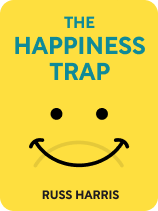

This article is an excerpt from the Shortform book guide to "The Happiness Trap" by Russ Harris. Shortform has the world's best summaries and analyses of books you should be reading.
Like this article? Sign up for a free trial here .
What is Russ Harris’s The Happiness Trap about? What’s the key message to take away from the book?
In The Happiness Trap, Russ Harris explores Acceptance and Commitment Therapy, or ACT, a psychological discipline developed by Steven C. Hayes in 1982. While Harris didn’t develop ACT, his 2007 book helped popularize ACT, which uses a combination of behavioral and mindfulness principles and strategies.
Here is our review of The Happiness Trap: Stop Struggling, Start Living by Russ Harris.
About the Author
Harris is a medical practitioner, psychotherapist, life coach, and consultant to the World Health Organization. (He wrote a stress management protocol for use in refugee camps.) He’s presented hundreds of workshops and trained more than 50,000 health professionals in ACT in the US, UK, Europe, and Australia.
Harris claims that discovering and practicing ACT as a physician in Australia in his late 20s helped him overcome depression and stress. He noticed that many of his patients suffered from the same problems, so he switched his field to therapy to help more people.
He’s since written multiple ACT-based textbooks and self-help books besides The Happiness Trap, including:
- ACT With Love (2009)
- The Confidence Gap (2011)
- The Reality Slap (2012)
- Getting Unstuck in ACT (2013)
- The Illustrated Happiness Trap (2014)
- ACT Questions and Answers (2018, for clinicians)
- ACT Made Simple (2009 revised 2019, a textbook for professionals)
- Trauma-Focused ACT (2021, for clinicians)
- When Life Hits Hard (2021)
Harris also offers ACT courses online for laypeople and clinicians, as well as corporate programs. In addition, he is co-director of PsyFlex, which works with businesses and organizations to improve their work environments by applying a non-therapy version of ACT.
Connect with Russ Harris:
The Book’s Publication
- Publisher: Trumpeter Books, an imprint of Shambhala Publications Inc.
The Happiness Trap was published in Australia in March 2007. According to Amazon, it’s an international bestseller, having sold more than one million copies, with editions published in more than 30 languages.
It ranks fourth among Amazon bestsellers on depression and 22nd among cognitive psychology books.
Historical Context
Positive-thinking approaches to living a happier, more successful life, have dominated self-help books and media since the genre’s blooming in the 1920s. In 2007, the year The Happiness Trap was published, competing titles about harnessing your thoughts for change included:
- Change Your Thoughts—Change Your Life, Wayne W. Dyer
- Train Your Mind, Change Your Brain, Sharon Begley
- The Intention Experiment: Using Your Thoughts to Change Your Life and the World, Lynne McTaggart (on positive thinking)
- Reposition Yourself, T.D. Jakes
- The Astonishing Power of Emotions, Esther Hicks and Jerry Hicks (on positive thinking and the law of attraction)
In contrast to these books’ focus on changing your thoughts and yourself, Harris advocated self-acceptance, especially accepting negative thoughts and feelings as inevitable and, at times, useful. Further, he presented ACT as empirically supported, unlike the ideas of some self-help gurus.
Intellectual Context
ACT (pronounced like the word “act”) was developed by psychologist Steven C. Hayes and other researchers in the mid-1980s. It aims to help people handle painful thoughts and feelings while living a meaningful, satisfying life by applying six techniques or skills to develop “psychological flexibility.” (Hayes discussed the latter concept in a TED talk.)
In The Happiness Trap, Harris cites studies indicating this behavioral/mindfulness method helps people with a range of concerns, including anxiety, stress, chronic pain, drug addiction, smoking, and depression.
ACT is the opposite of positive psychology, started in the 1990s by psychologist and bestselling author Martin Seligman to study what happiness is, and to help patients live happier lives (rather than studying what makes people mentally ill). In contrast, ACT proponents like Harris argue that happiness isn’t human’s natural state, therefore positive psychology raises unrealistic expectations.
Further, Harris notes that we sometimes need to pay attention to and deal with negative feelings. Also, many of our most meaningful experiences encompass both happiness and unhappiness. While ACT and positive psychology take opposite approaches, both are recognized as valid by the American Psychological Association (APA).
Still, in 2011, APA published a critical analysis noting that while ACT presented itself as a new, “third wave” of behavioral treatment, proponents of traditional CBT (cognitive behavior therapy) believed that ACT didn’t deserve the hype because it represented only minor variations of CBT.
In addition, critics caution that ACT’s techniques of contemplating negative thoughts and feelings may not always be appropriate for trauma recovery. (While there’s little research on the adverse effects of mindfulness practices like those ACT promotes, one study found that mindfulness-based programs caused adverse effects in 37-58% of participants.)
Harris disagrees that ACT is an inappropriate tool for trauma recovery, although he advises that trauma patients practice the techniques with a therapist rather than on their own. Harris’s 2021 book, Trauma-Focused ACT, advocates resolving traumatic memories through “flexible exposure.”
The Book’s Impact
Many psychologists and therapists recommend the book to clients because of its accessible presentation of ACT principles, as well as its practical exercises. It also appears on multiple lists of therapists’ most-recommended books.
Critical Reception
Many readers praise the book for offering specific, practical techniques for easing stress and anxiety, while not making sweeping claims; some call it life-changing. Others call the book a great introduction to ACT, lauding its simple explanations of ACT concepts and the fact that ACT overall is evidence-based.
Steven C. Hayes, the founder of ACT, praised the book for its exploration of how we fall into the happiness trap and for presenting the practical techniques in a creative, accessible way.
However, some of The Happiness Trap reviews say the book is too elementary for those who already have basic self-awareness and who have worked on examining their thoughts and behaviors. A few think it should carry a warning for trauma survivors.
Additionally, some readers deem Harris disrespectful for failing to mention or credit Eastern religion and philosophy, especially Buddhism, for the mindfulness concepts and practices at the foundation of ACT. Another questioned the extent to which ACT theories may or may not apply to non-white people and cultures, claiming that the studies on ACT’s effectiveness focused on white sample populations.

———End of Preview———
Like what you just read? Read the rest of the world's best book summary and analysis of Russ Harris's "The Happiness Trap" at Shortform .
Here's what you'll find in our full The Happiness Trap summary :
- Why trying to be happy is making you unhappy
- How to practice ACT, or Acceptance and Commitment Therapy, to become happier
- How to develop “psychological flexibility” toward negative feelings instead of eliminating them






